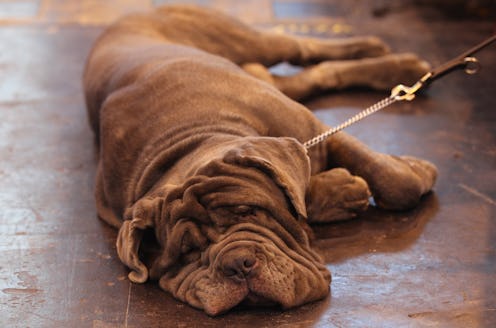Books
Doing This For 6 Minutes Will Help You Sleep
If you have trouble sleeping, you may have tried anything from taking melatonin pills, to drinking a glass of warm milk or wine before bed, to counting sheep to try to fall asleep. But according to a recent study, there's an even easier way to catch those much-needed Z's: reading for six minutes before bed can help you sleep better. Six minutes? That's a piece of cake. You'd barely even need to shut off Netflix any earlier than usual in order to fit in your reading time.
Scientists believe that reading is the best way to relax because immersing yourself into another world takes your mind off of your current problems better than other coping mechanisms, like listening to music or drinking a cup of tea. In a study conducted at the University of Sussex, researchers put this hypothesis to the test and gave subjects either a book to read, music to listen to, or tea to drink, and then measured their stress levels and heart rates before and after performing their assigned activity. They found that those who read experienced a 68 percent reduction in stress levels, while music lowered stress 61 percent, tea by 54 percent, and taking a walk by 42 percent. Which is especially good news considering out of all those activities, reading is a whole lot easier to do in bed than drinking a hot beverage or taking a walk would be. And the best part? It only takes six minutes for your body to start feeling the de-stressing effects like a lower heart rate and lessened muscle tension.
And although you might be worrying that a mystery novel with lots of suspense will do you a disservice and keep you up at night, scientists say the genre shouldn't make a difference. Dr. David Lewis, the cognitive neuropsychologist who conducted the study said, "It really doesn't matter what book you read, by losing yourself in a thoroughly engrossing book you can escape from the worries and stresses of the everyday world." So go ahead and crack open that Stephen King book — not necessarily what I would read in order to get a good night's sleep, but if you can get into it without having nightmares, then I'm not going to knock it.
If reading isn't doing it for you, there are certainly other ways to help you sleep better. You already know that you should turn off your electronics before bed so your brain isn't over-stimulated, so here are a few more ways to ensure you get good shut-eye.
Turn Your Clock Away From You
From my own personal experience, hiding my alarm clock from view of my bed has done wonders for my sleep — no longer do I look over to my nightstand in despair that I'll only have five hours of sleep if I fall asleep in the next five minutes. WebMD backs me up on this: glancing at the clock throughout the night is only going to make you stress out about how little sleep you can get, so cover it up, put it in a drawer, or turn it away from you. Clock-block yourself, in a way.
Change How You Think About Sleep
It sounds a lot easier said than done, but doctors believe that a large part of difficulty sleeping comes from the fact that we place so much emphasis on sleep that the mere possibility of not sleeping stresses us out. When you're stressed out, you can't sleep, and it just becomes a cycle where every time you get into bed, you're automatically worrying and in a bad place. Doctors recommend patients "not catastrophize" having a bad night — sure, you'll feel pretty zombie-like the next day after you don't sleep, but more likely than not you'll make it through. And, hey, if you don't sleep tonight, you'll probably be so exhausted that you'll pass out tomorrow night. Once you stop thinking of sleep as the end-all-be-all, paradoxically, you just might get more of it.
Practice Reverse Psychology On Yourself
Psychotherapist Julie Hirst recommends challenging yourself to stay awake when all you really want to do is conk out. The reason? It's called the sleep paradox — apparently your brain doesn't like to process negative statements, so if you keep your eyes open and repeat "I will not sleep," your brain will actually think you're instructing it to sleep, and your eyes will start getting heavy and you'll feel very, very sleepy. I'm not sure about this one — I feel like my scumbag brain would just take that as an invitation to keep me up even longer — but it's simple enough that it would be worth giving a shot.
Images: sharyn morrow / Flickr; Giphy
